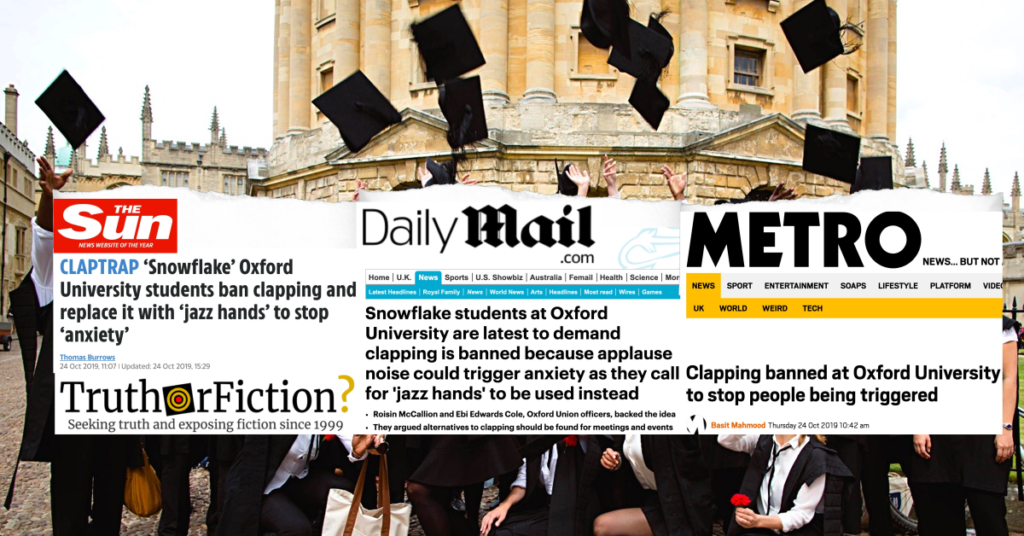In October 2019, a number of tabloids claimed that the University of Oxford had “banned clapping,” a move made at the behest of “snowflakes” made “anxious” by applause.
The Daily Mail was one of those outlets, reporting:
Snowflake students at Oxford University are latest to demand clapping is banned because applause noise could trigger anxiety as they call for ‘jazz hands’ to be used instead
- Roisin McCallion and Ebi Edwards Cole, Oxford Union officers, backed the idea
- They argued alternatives to clapping should be found for meetings and events
- Jazz hands is a sign language expression for applause involving hand waving
- It was argued that traditional applause poses problems for those with anxiety
Snowflake students at Oxford University are the latest to demand that clapping should be banned because applause noise can trigger anxiety and want ‘jazz hands’ to be used instead.
Noting that “snowflake students” were the latest to “demand” clapping be banned, the site reported that there were proposed alternatives, including what they described as “jazz hands.” A headline on a story from The Sun blared, “CLAPTRAP ‘Snowflake’ Oxford University students ban clapping and replace it with ‘jazz hands’ to stop ‘anxiety,'” quoting people who were apparently offended by the ban:
Student union leaders hope it will make its meetings and events more accessible and inclusive to those with anxiety.
One former student fumed: “Oxford University Student Union is always seeking to be more accommodating.
“But this idea will not work and is completely ludicrous.”
Another outrage-bait headline emanated from Metro, suggesting that clapping was banned at Oxford University “to stop people being triggered”:
Students at the University of Oxford have voted to ‘replace clapping’ with a silent wave because it ‘could trigger anxiety’.
They are instead being told to use ‘jazz hands’, where they wave their hands in the air.
The motion to ‘mandate the encouragement of silent clapping’ was successfully passed by the university’s student union officers, following their first meeting of the year on Tuesday. It will come apply at student union events, and if successful, rolled out to other societies and events.
Oxford students had argued that alternatives to clapping already existed in some organisations and institutions and that they should follow suit.
Other iterations of the claim emphasized that “jazz hands” as a gesture was more inclusive to anxiety sufferers, with some stories strongly implying that “jazz hands” had been selected to mollify people with delicate sensibilities. Tacked on to the end of that item was the following, more honest characterization:
Jazz hands is the British Sign Language expression for applause and is considered a more inclusive gesture.
Sabbatical Officers Roisin McCallion said: ‘The policy was proposed in order to encourage the use of British Sign Language clapping during our democratic events, to make those events more accessible and inclusive for all, including people who suffer from anxiety.
Note that in that context, the British Sign Language gesture for “applause” was indeed more “inclusive” — but for hearing impaired people and those with sensory sensitivities, not fun-hating “snowflakes.” Across all three tabloid articles, it would be reasonable to walk away with the impression that clapping was “banned” thanks to demands from the emotionally sensitive.
However, an October 23 2019 Oxford Student campus newspaper article reported the change much more clearly and accurately:
SU Adopts BSL Clapping To Replace Traditional Applause
The first Student Council meeting of the academic year, [on October 22 2019], passed the motion to mandate the Sabbatical Officers to encourage the use of British Sign Language (BSL) clapping, otherwise known as ‘silent jazz hands’ at Student Council meetings and other official SU events.
The motion was presented to Council last year by Ellie Macdonald (former VP Welfare and Equal Opportunities) and Ebie Edwards Cole (Chair for Oxford SU Disabilities Campaign), presented again this year by Ebie and Roisin McCallion (VP Welfare & Equal Opportunity).
BSL clapping is used by the National Union of Students since loud noises, including whooping and traditional applause, are argued to present an access issue for some disabled students who have anxiety disorders, sensory sensitivity, and/or those who use hearing impairment aids.
First and foremost, clapping was not banned as the headlines inaccurately claimed — it was simply replaced as a default with sign language. The reasoning, as explained by the original school paper reporting, was that audible applause as well as whooping and yelling presented an access issue for hearing impaired students as well as those diagnosed with anxiety or sensory processing disorders.
Second, that was in no way a “ban.” Instead of defaulting to a mainly auditory response (whooping, clapping), the students agreed to use sign language in order to make their gatherings more accessible. Misleading descriptions of disability accommodations and inclusivity as a “ban” is a common tactic to create “ragebait” headlines by falsely insinuating such accommodations are forced upon the public at large by “offended” people rather attempting to include the requests of people with disabilities and their advocates.
In short, Oxford University did not “ban clapping,” nor did it acquiesce to “demands” made by “snowflakes.” Oxford’s student union voted to encourage the use of British Sign Language for applause so that students could more fully participate in ceremonies, but clapping and cheering have not been banned.
- Snowflake students at Oxford University are latest to demand clapping is banned because applause noise could trigger anxiety as they call for 'jazz hands' to be used instead
- CLAPTRAP ‘Snowflake’ Oxford University students ban clapping and replace it with ‘jazz hands’ to stop ‘anxiety’
- Clapping banned at Oxford University to stop people being triggered Read more: https://metro.co.uk/2019/10/24/clapping-banned-oxford-university-stop-people-triggered-10975221/?ito=cbshare Twitter: https://twitter.com/MetroUK | Facebook: https://www.facebook.com/MetroUK/
- SU Adopts BSL Clapping To Replace Traditional Applause
- ban

